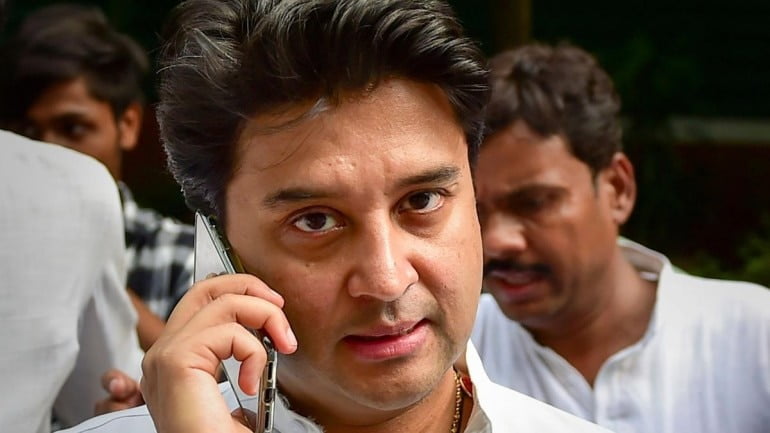
March 9, 2020 will be remembered as the day of one of the most massive shake-ups in the recent history of Indian politics. Four-time Member of Parliament, a former union minister and a personal friend of the Gandhi siblings, Jyotiraditya Scindia resigned from the Congress.
Though there had been talk of Jyotiraditya Scindia joining the BJP for the past six months, it was not taken seriously and mainly confined to the realm of speculation. Scindia was perceived to be close to Rahul Gandhi and was the son of the late Madhavrao Scindia, who was a personal friend of Rajiv Gandhi. Even those who regard politics as the art of the possible felt Scindia would not break from the party. The BJP, accused of being parochial and narrow, was also not seen as his type of party.
So what changed? Personal ambition and marginalization within the party seems to have pushed him to a decision perhaps he would not have wanted to make.
Jyotiraditya Scindia had been appointed the campaign committee chairman prior to the Madhya Pradesh Assembly elections in 2018. Scindia harboured hopes of being appointed PCC President back then but the party decided to appoint Kamal Nath instead. Scindia and Kamal Nath had not really been close to each other.
In fact, even late Madhav Rao Scindia and Kamal Nath who were contemporaries, were not a team in state politics. Eventually, after Nath was appointed PCC President, Scindia, Kamal Nath and Digvijaya Singh struck a working relationship and managed to pull off a Congress victory, albeit marginally. Scindia had hoped that the party would consider his candidature for the top job but eventually Kamal Nath was chosen as the chief ministerial face to keep all factions happy.
Cabinet formation proved to be a tough exercise for Kamal Nath. He eventually inducted eight cabinet ministers from the Scindia camp, a handsome number given that Scindia had about 25 MLAs in his camp. Scindia was also given a free hand in the administration of the districts of the Gwalior and Chambal. Consequently, the Collectors and SPs of almost all districts of the region were changed immediately after elections.
The honeymoon period did not continue for very long. In the 2019 Lok Sabha elections, one of the most upsetting outcomes for the Congress was the defeat of Jyotiraditya Scindia on his home turf of Guna. He had lost the Lok Sabha seat by a margin of around 1.25 lakh votes. The defeat proved to be more painful because it came at the hands of a political light-weight, his one-time representative as MP. Scindia took the defeat rather badly and it was understandable. Guna had been the safest seat for a Scindia. His father and grandmother had been elected from Guna before him, on multiple party tickets and as independents. Scindia had also been appointed General Secretary in charge of Uttar Pradesh. The results proved to be a dud for the Congress in UP.
What corresponded with the Lok Sabha defeat was the flight of Rahul Gandhi from party affairs. Rahul Gandhi’s announcement of relinquishing charge of Congress President left those close to him high and dry. Scindia was one such leader. Rahul Gandhi’s exit meant the old guard returning in Congress and it led to Kamal Nath becoming more powerful.
At least three ministers who owed allegiance to Scindia in the state also began to ingratiate themselves to Kamal Nath. For Scindia, who demands complete loyalty from his followers, this was unacceptable. A couple of MLAs from his camp, who had not been made ministers and had missed the bus, also began to show signs of crossing over to the Kamal Nath camp.
Scindia’s followers then began demanding the post of PCC President for him. Meanwhile, Scindia too began touring the state and began to have showdowns with the state government. He raised the issue of lack of relief owing to flood damage, giving jobs to contractual teachers and emerged as some sort of opposition within the Congress. His supporters also began to raise the demand of giving Scindia a Rajya Sabha nomination from the state.
In February, during a coordination committee meeting in Delhi, Scindia walked out over differences with Kamal Nath. He said he would be hitting the streets to which Nath responded with he is free to do so’. The ties between Scindia and Kamal Nath had hit a new low.
In early March when four Congress MLAs and an independent went missing, and the entire Congress leadership was working to diffuse the crisis, Jyotiraditya Scindia was conspicuous by his absence. The die had perhaps been cast by then. On March 9, just when things seemed to be getting in control for the Congress, in a swift move, 19 Congress MLAs including six ministers from the Scindia camp, were packed off to Bangalore which in recent times has emerged as ground zero for defections and dubious political operations.
On Tuesday, Scindia announced his break from the Congress through a letter addressed to the Congress president.
What is the sort of future Scindia can expect in the BJP? The BJP’s working in Madhya Pradesh is very different from the Congress’. The Bhai Sahab’ culture pervades the party whereas the Congress in MP has for long been a public schoolboys club. There are no points for guessing which set up Scindia would be more comfortable in. Why only Madhya Pradesh, Jyotiraditya Scindia’s friends within the BJP in Delhi were the late Arun Jaitley and now Piyush Goyal, both not the Bhai Sahab’ type in the BJP. But more importantly, while these differences are superficial and can be overcome when the objective is power, there are other more rooted issues.
In the Gwalior Chambal region, the divisions in politics are more Mahal vs Anti Mahal- with Mahal being synonymous with the erstwhile ruling family of Gwalior, rather than Congress vs BJP. Earlier while Jyotiraditya Scindia was the prominent leader of the Mahal group in the Congress, Dr Govind Singh and KP Singh were seen as the anti-Mahal face of the Congress. Similarly, Yashodhara Raje, Dhyanedra Singh and Maya Singh are the Mahal face in the BJP, Jaibhan Singh Pawaiya and Prabhat Jha are known as Jyotiraditya Scindia baiters in the BJP. It would be interesting to see how they respond to the inclusion of Scindia in the party.
Other prominent leaders of the BJP from the region, Narendra Singh Tomar and Narottam Mishra are not pro-Mahal either. While all BJP leaders show regard for late Vijayaraje Scindia who in many senses set up the BJP in the state, owing to the present political situation, they are now opposed to Scindias in the BJP.
In all likelihood, Scindia would be used by the BJP in central politics. Even a hint of projecting him as a BJP chief ministerial candidate would lead to a lot of heartburn within the rank and file of the BJP. Madhya Pradesh is one of the most solid states for the BJP where the party has had deep inroads right from Jan Sangh days.
What then of the 22 MLAs who have resigned from their seats to show support with Scindia? Many among them have had age-old political rivalries with local BJP leaders. Prabhuram Chaudhry, one of the ministers who had ditched the Congress has been fighting the BJP’s Dr Gauri Shankar Shejwar for the longest time. Tulsi Silawat, another minister has been opposed to the BJP’s ideology. How will these differences be smoothened, will be an exercise in itself.
[“source=indiatoday”]





